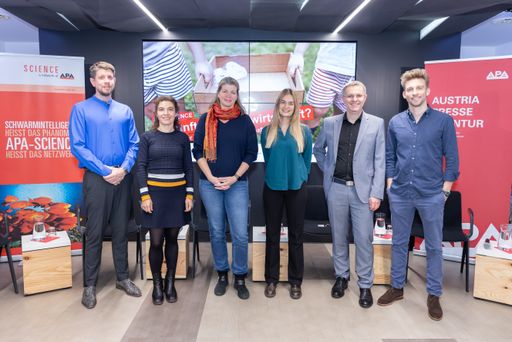Circular economy is considered an important key in the fight against climate change and in protecting finite resources. On Wednesday evening at the APA Science event “The Future of the Circular Economy?”, experts emphasized how important systemic change is here. Around 100 participants followed the discussion moderated by APA editor-in-chief Maria Scholl on site in the APA press center and online.
Humanity is facing a “triple planetary crisis”: climate change, biodiversity loss and pollution. In order to counteract it, we need to use resources sustainably, said social ecologist Nina Eisenmenger from Boku University in Vienna. The “social metabolism” means that a certain input of resources results in their use in the form of materials and thus also emissions and waste. The problem, whether with resource use, with stocks such as buildings or roads, with waste: “We are seeing an increase in all curves – that can only be a problem.” The main drivers for the increase are the built environment and mobility, followed by energy and food systems.
Austria is miles away from the national goal of reducing the material footprint to 7 tons per capita per year by 2050 – domestic material consumption is currently around 17 tons. “Recycling” is important, says Eisenmenger, but it is also primarily about the further goals of the circular concept, such as rethinking product design.
The material flow analyzes clearly show the need to take action, said complexity researcher Peter Klimek, director of the Supply Chain Intelligence Institute Austria (ASCII). But: “Individual market participants only have limited opportunities to implement circular economy. It’s all about the systemic change process,” simply because of the branched value chains. The researcher from the Complexity Science Hub Vienna sees the fact that the circular economy could inhibit innovation as less of a threat: “I would rather see it as an engine for innovation – even if you have to set the framework so that the engine can start.”
Recycling is the most popular form of circularity. But can’t the trade in “refurbished” products, such as cell phones or computers, also fuel consumption? “If you want to consume, you consume,” said Kilian Kaminski, co-founder of Refurbed, an online marketplace for refurbished electrical appliances. Rather, with a wide range of products, you can also offer groups with less purchasing power sustainable quality – as an alternative to cheap products from Asia, such as a remanufactured brand-name washing machine. As a further important factor, the board member of the “European Refurbishment Association” referred to the importance of regulations on “greenwashing”, such as the “EU Green Claims Directive”, in order to combat the unjustified use of the term in business, but rather only for branding and marketing purposes circular economy approach.
As a representative of Austria’s oil, natural gas and petrochemical group OMV, Andreas Leitner, Senior Vice President of Innovation and Technology, emphasized the expected long implementation time for transformation processes. “Yes, the goal of becoming climate neutral by 2050 sounds almost impossible as an oil and gas company.” But there are also corresponding projects, for example to expand geothermal energy or to recycle plastic, that are being pushed forward.
Alexandra Kick, co-founder of Thinkubator, a think tank for the circular economy, referred to the role of education in supporting a change towards a circular economy: As her experience shows, it would help with younger people, for example in the family about waste generation or the Talk about material throughput. “Regulations and pressure are important, but above all you need positive examples.” One must put more existing knowledge into practice and try to “transform into action” the feeling of powerlessness that often arises in view of the complexity.
Even if the question quickly arises as to how one can position oneself in view of global value chains, political developments or the complexity of the topic as a whole: circular approaches could also be implemented on a smaller level, for example in the district – for example in spatial planning and at the Design of the mobility offer. The experts agreed that a central factor was consumer behavior. Society must negotiate “how we want to live.” Disasters such as floods played a role here: “People feel that something has to be done,” added Eisenmenger.
Video recording and presentations of the event
More pictures in the APA image gallery
In addition to the discussion, APA-Science offers the current Main topic “Circular economy in construction”. Innovative approaches are examined to use resources intelligently when planning construction projects, to extend the lifespan of materials and buildings and to redesign the recycling and thus return of materials into the cycle. Numerous experts from research institutions, initiatives and organizations as well as business will have their say.
About APA Science
The platform science.apa.at reports on education, science and research in Austria. It was initiated by the APA – Austria Press Agency and is supported by partners. APA-Science sees itself as a mouthpiece for researchers and as a bridge builder to the Austrian media and the public.
In addition to daily reporting on research, science, innovation, technology and education, the APA Science editorial team also regularly researches and publishes exclusive reports and key topics.
Attachments
- APA Science Event: Experts discussed “The future of the circular economy?”
- APA Science Event: Experts discussed “The future of the circular economy?”
